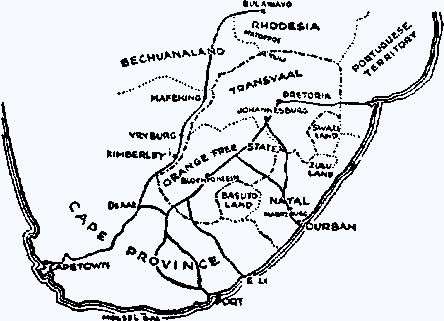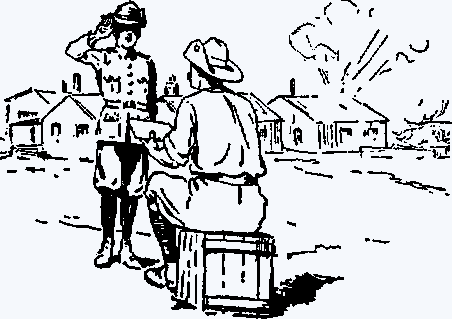Boys of Mafeking
We had an example of how useful boys can be on active service, when a corps of boys was formed in the defence of Mafeking, 1899-1900, during the South African War.
Mafeking, you may know, was a small, ordinary country town out on the open plains of South Africa. Nobody ever thought of it being attacked by an enemy. It just shows you how, in war, you must be prepared for what is possible, not only what is probable.
When we found we were to be attacked at Mafeking, we ordered our garrison to the points they were to protect-some 700 trained men, police, and volunteers. Then we armed the townsmen, of whom there were some 300. Some of them were old frontiersmen, and quite equal to the occasion. But many of them were young shopmen, clerks, and others, who had never handled a rifle before.

Here is a map of South Africa. If you look carefully, you will find Mafeking and many other places mentioned in this book.
Altogether, then, we only had about a thousand men to defend the place, which was about five miles round and contained 600 white women and children and about 7000 Africans and local inhabitants.
Every man was of value, and as the weeks passed by and many were killed and wounded, the duties of fighting and keeping watch at night became harder for the rest.
The Mafeking Cadet Corps
It was then that Lord Edward Cecil, the chief staff officer, gathered together the boys of Mafeking and made them into a cadet corps. He put them in uniform and drilled them. And a jolly smart and useful lot they were. Previously, we had used a large number of men for carrying orders and messages, keeping lookout and acting as orderlies, and so on. These duties were now handed over to the boy cadets, and the men were released to strengthen the firing-line.
The cadets, under their sergeant-major, a boy named Goodyear, did good work, and well deserved the medals they got at the end of the war.
Many of them rode bicycles, and we were thus able to establish a post by which people could send letters to their friends in the different forts, or about the town, without going out under fire themselves. For these letters we made postage stamps which had on them a picture of a cadet bicycle orderly.
I said to one of these boys on one occasion, when he came in through a rather heavy fire:
"You will get hit one of these days riding about like that when shells are flying."
"I pedal so quick, sir, they'll never catch me!" he replied.
These boys didn't seem to mind the bullets one bit. They were always ready to carry out orders, though it meant risking their lives every time.

The boys of Mafeking did excellent service. They were gathered together into a cadet corps, put into uniform and drilled.
Would You Do It?
Would any of you do that? If an enemy were firing down this street, and you had to take a message across to a house on the other side, would you do it? I am sure you would-although probably you wouldn't much like doing it.
But you want to prepare yourself for such things beforehand. It's just like taking a header into cold water. A fellow who is accustomed to diving thinks nothing of it-he has practised it over and over again. But ask a fellow who has never done it, and he will be afraid.
So, too, with a boy who has been accustomed to obey orders at once, whether there is risk about it or not. The moment he has to do a thing he does it, no matter how great the danger is to him, while another chap who has never cared to obey would hesitate, and would then be despised even by his former friends.
But you need not have a war in order to be useful as a scout. As a peace scout there is lots for you to do-any day, wherever you may be.
Author
Lord Baden-Powell of Gilwell (Chief Scout, London, UK)
Date of Creation
1908
Learn A Continuation:
to the next page: Living in the Open
Back in The Past:
to the previous page: The Adventures of Kim
Мнение автора и других создателей данного материала
может не совпадать с официальной позицией администрации сайта.
При использовании материалов сайта обратная ссылка на GomelScouts.com обязательна.